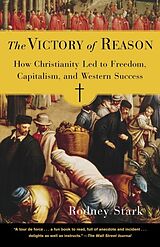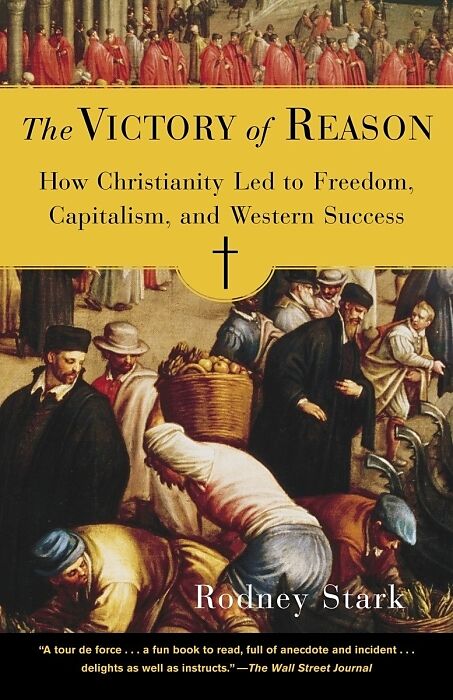The Victory of Reason
Einband:
Kartonierter Einband
EAN:
9780812972337
Untertitel:
How Christianity Led to Freedom, Capitalism, and Western Success
Genre:
Geschichte
Autor:
Rodney Stark
Herausgeber:
Random House Publishing Group
Anzahl Seiten:
304
Erscheinungsdatum:
01.10.2006
ISBN:
978-0-8129-7233-7
Informationen zum Autor Rodney Stark is University Professor of the Social Sciences, Baylor University. Before earning his Ph.D. at the University of California, Berkeley, he was a staff writer for several major publications. Among his many books are the influential studies The Rise of Christianity and One True God: Historical Consequences of Monotheism. Klappentext Many books have been written about the success of the West, analyzing why Europe was able to pull ahead of the rest of the world by the end of the Middle Ages. The most common explanations cite the West's superior geography, commerce, and technology. Completely overlooked is the fact that faith in reason, rooted in Christianity's commitment to rational theology, made all these developments possible. Simply put, the conventional wisdom that Western success depended upon overcoming religious barriers to progress is utter nonsense.In The Victory of Reason, Rodney Stark advances a revolutionary, controversial, and long overdue idea: that Christianity and its related institutions are, in fact, directly responsible for the most significant intellectual, political, scientific, and economic breakthroughs of the past millennium. In Stark's view, what has propelled the West is not the tension between secular and nonsecular society, nor the pitting of science and the humanities against religious belief. Christian theology, Stark asserts, is the very font of reason: While the world's other great belief systems emphasized mystery, obedience, or introspection, Christianity alone embraced logic and reason as the path toward enlightenment, freedom, and progress. That is what made all the difference.In explaining the West's dominance, Stark convincingly debunks long-accepted "truths. For instance, by contending that capitalism thrived centuries before there was a Protestant work ethic-or even Protestants-he counters the notion that the Protestant work ethic was responsible for kicking capitalism into overdrive. In the fifth century, Stark notes, Saint Augustine celebrated theological and material progress and the institution of "exuberant invention. By contrast, long before Augustine, Aristotle had condemned commercial trade as "inconsistent with human virtue-which helps further underscore that Augustine's times were not the Dark Ages but the incubator for the West's future glories. This is a sweeping, multifaceted survey that takes readers from the Old World to the New, from the past to the present, overturning along the way not only centuries of prejudiced scholarship but the antireligious bias of our own time. The Victory of Reason proves that what we most admire about our world-scientific progress, democratic rule, free commerce-is largely due to Christianity, through which we are all inheritors of this grand tradition.chapter one Blessings of Rational Theology christian faith in progress theology and science China Greece Islam moral innovations the rise of individualism the abolition of medieval slavery Theology is in disrepute among most Western intellectuals. The word is taken to mean a passé form of religious thinking that embraces irrationality and dogmatism. So too, Scholasticism. According to any edition of Webster's, scholastic means pedantic and dogmatic, denoting the sterility of medieval church scholarship. John Locke, the eighteenth-century British philosopher, dismissed the Scholastics as the great mintmasters of useless terms meant to cover their ignorance.1 Not so! The Scholastics were fine scholars who founded Europe's great universities and launched the rise of Western science. As for theology, it has little in common with most religious thinking, being a sophisticated, highly rational discipline that is fully developed only in Christianity. Sometimes described as the science of faith,2 theology consists o...
Autorentext
Rodney Stark is University Professor of the Social Sciences, Baylor University. Before earning his Ph.D. at the University of California, Berkeley, he was a staff writer for several major publications. Among his many books are the influential studies The Rise of Christianity and One True God: Historical Consequences of Monotheism.
Klappentext
Many books have been written about the success of the West, analyzing why Europe was able to pull ahead of the rest of the world by the end of the Middle Ages. The most common explanations cite the West's superior geography, commerce, and technology. Completely overlooked is the fact that faith in reason, rooted in Christianity's commitment to rational theology, made all these developments possible. Simply put, the conventional wisdom that Western success depended upon overcoming religious barriers to progress is utter nonsense.In The Victory of Reason, Rodney Stark advances a revolutionary, controversial, and long overdue idea: that Christianity and its related institutions are, in fact, directly responsible for the most significant intellectual, political, scientific, and economic breakthroughs of the past millennium. In Stark's view, what has propelled the West is not the tension between secular and nonsecular society, nor the pitting of science and the humanities against religious belief. Christian theology, Stark asserts, is the very font of reason: While the world's other great belief systems emphasized mystery, obedience, or introspection, Christianity alone embraced logic and reason as the path toward enlightenment, freedom, and progress. That is what made all the difference.In explaining the West's dominance, Stark convincingly debunks long-accepted "truths.” For instance, by contending that capitalism thrived centuries before there was a Protestant work ethic-or even Protestants-he counters the notion that the Protestant work ethic was responsible for kicking capitalism into overdrive. In the fifth century, Stark notes, Saint Augustine celebrated theological and material progress and the institution of "exuberant invention.” By contrast, long before Augustine, Aristotle had condemned commercial trade as "inconsistent with human virtue”-which helps further underscore that Augustine's times were not the Dark Ages but the incubator for the West's future glories. This is a sweeping, multifaceted survey that takes readers from the Old World to the New, from the past to the present, overturning along the way not only centuries of prejudiced scholarship but the antireligious bias of our own time. The Victory of Reason proves that what we most admire about our world-scientific progress, democratic rule, free commerce-is largely due to Christianity, through which we are all inheritors of this grand tradition.
Leseprobe
chapter one
Blessings of Rational Theology
christian faith in progress
theology and science
China Greece Islam
moral innovations
the rise of individualism
the abolition of medieval slavery
Theology is in disrepute among most Western intellectuals. The word is taken to mean a passé form of religious thinking that embraces irrationality and dogmatism. So too, Scholasticism. According to any edition of Webster’s, “scholastic” means “pedantic and dogmatic,” denoting the sterility of medieval church scholarship. John Locke, the eighteenth-century British philosopher, dismissed the Scholastics as “the great mintmasters” of useless terms meant “to cover their ignorance.”1 Not so! The Scholastics were fine scholars who founded Europe’s great universities and launched the rise of Western science. As for theology, it has little in common with most religious thinking, being a sophisticated, highly rational discipline that is fully developed only in Christianity.
Sometimes described as “the science of faith,”2 theology consists of formal reasoning about God. The emphasis is on discove…

Leider konnten wir für diesen Artikel keine Preise ermitteln ...
billigbuch.ch sucht jetzt für Sie die besten Angebote ...
Die aktuellen Verkaufspreise von 6 Onlineshops werden in Realtime abgefragt.
Sie können das gewünschte Produkt anschliessend direkt beim Anbieter Ihrer Wahl bestellen.
Loading...
Die aktuellen Verkaufspreise von 6 Onlineshops werden in Realtime abgefragt.
Sie können das gewünschte Produkt anschliessend direkt beim Anbieter Ihrer Wahl bestellen.
| # | Onlineshop | Preis CHF | Versand CHF | Total CHF | ||
|---|---|---|---|---|---|---|
| 1 | Seller | 0.00 | 0.00 | 0.00 |
